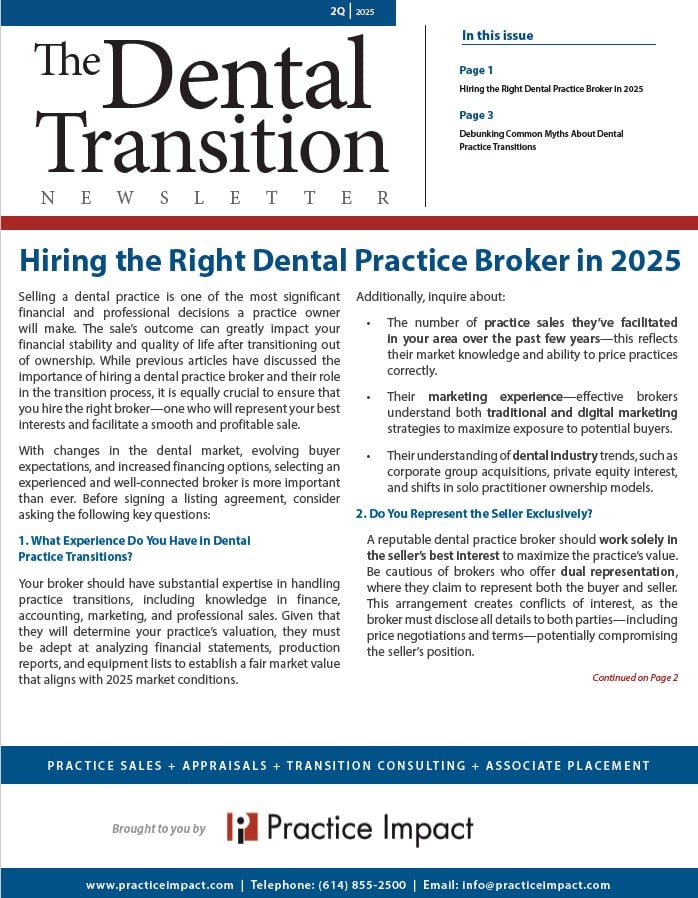Top 10 Things to Do Before Selling Your Practice
1. Plan Ahead: On average, it takes 6-18 months to sell a dental practice, depending on the practice and location. You will need to give your broker time to properly market the practice and get you the best possible offer. You will need to be patient and continue working while your practice is on the market and not get ahead of yourself when planning your exit from the practice.
2. Meet with your Financial Advisor: Before making the life changing decision to sell your practice, you want to make sure that you can afford to sell and that it is in your best interest. There is no point in listing the practice for sale only to find out later that it does not make financial sense for you to sell. You also need to ask your accountant what the tax ramifications of selling your practice will be and plan for a favorable purchase price allocation.
3. Talk to and Hire a Dental Practice Broker: A reputable broker will guide you through the sale, valuate the practice, assist you with an asking price, market the practice, find a buyer and negotiate a sale. A broker will make the sale process run smoothly and take away the burden finding a qualified buyer while keeping the sale confidential. A good broker can also point you in the direction of financial and legal advisors if needed.
4. Obtain a Practice Valuation: Valuating the practice is a must before selling. Without a proper valuation there is no way guarantee that you are receiving a fair value for your practice. If you list your practice with PI, the valuation fee is waived so there is no added cost to you for obtaining the valuation report.
5. If you have an Associate, Make sure there is an Employment Contract: If your associate does not want to purchase your practice, you need to protect the practice’s value with an employment contract containing a restrictive covenant and non-solicitation clause. If the associate were to leave before the sale or is not hired by the buyer, not having a restrictive covenant and non-solicitation clause can drive down the value of your practice.
6. Do Not Slow Down: Although you may be mentally ready to retire, you should keep your weekly clinical hours the same as long as you are physically able to. Cutting your hours will reduce production and collection, negatively affecting the value of the practice and selling price by making the practice appear to be in decline.
7. “Weed Out” Your Accounts Receivables: Although this should be done on a regular basis even when you are not contemplating selling, most practices have accounts receivables that should be written off or sent to collections. A high amount of uncollectable accounts can negatively affect the sale and negotiation process.
8. Take a look at your fee schedule: Do an analysis to find out if your fees are comparable to others in the area. If your fees are too low, then raise them now; no buyer wants to have to increase the fees immediately. Additionally, a fee increase will raise your practice income.
9. Revive your Recall System: Often times, older practices become a little lapse with patient recall. Strengthening your recall system will boost your production, patient number and keeps the schedule full thereby making your practice more attractive to potential buyers.
10. Clean up the Clutter and Spruce Up your Office: The practice should look neat and tidy; no one wants to purchase a dingy and out of date office. Making large equipment purchases is not warranted within a year or two of selling your practice, but making sure that the equipment is in good working order and making small, cosmetic updates to the office will enhance its appeal. Something as simple as a fresh coat of paint, new carpeting and updated pictures in the lobby may be all that you need.





